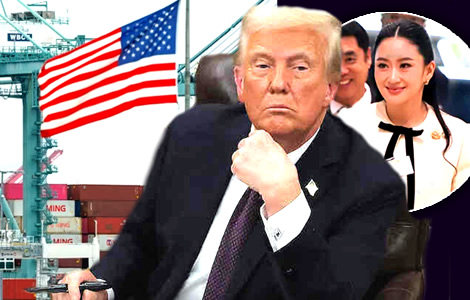Thai PM orders urgent review after US court blocks Trump’s sweeping tariffs, freezing 36% duties that threatened exports. With a White House appeal looming, Bangkok braces for trade fallout amid mounting uncertainty in Thailand’s top export market.
Thai Prime Minister Paetongtarn Shinawatra on Friday directed the government’s US tariff negotiation team, led by Finance Minister Pichai Chunhavajira, to convene and assess the recent ruling by the US Court of International Trade. The court struck down President Donald Trump’s retaliatory tariff regime, delivering a major blow to ongoing negotiations. This decision is expected to trigger an appeal from the White House, potentially escalating the case to the US Supreme Court. Meanwhile, Thai analysts urge caution as a complex legal and political battle unfolds in Thailand’s largest export market.

Under pressure from exporters and trade officials, Thailand is urgently assessing the fallout from a dramatic US court ruling. The decision, delivered on Thursday, has blocked core elements of Donald Trump’s sweeping new tariff plan, halting months of preparations and raising fresh uncertainty for global trade — including Thai exports.
The United States Court of International Trade ruled that Trump overstepped his legal authority when he announced broad new tariffs on April 2. These included a 10% baseline duty on most global imports and sharply higher “reciprocal” tariffs on trade surplus countries. Thailand, with a substantial U.S. trade surplus, was one of the top targets with a proposed 36% tariff.
Trump’s plan was framed under the International Emergency Economic Powers Act (IEEPA). However, the court found no valid national emergency. It declared that the IEEPA cannot be used to justify tariffs based on trade imbalances or wage differences.
US court ruling halts Trump’s sweeping tariff plan and raises fresh uncertainty for Thailand’s exports
The ruling came just days before the scheduled end of a 90-day tariff delay. Trump’s team had initially postponed enforcement to July 9. Customs and Border Protection (CBP) was preparing to activate the full tariff list next month. For Thailand, the proposed rate afterwards remains at 36% in the absence of trade talks. Now, that plan is frozen
In Bangkok, Prime Minister Paetongtarn Shinawatra immediately called for action. She instructed Finance Minister Pichai Chunhavajira to convene the US trade negotiations team.
The group will meet at Phitsanulok House to map out responses and prepare budget adjustments. Officials want all trade risks addressed before the new fiscal year begins on October 1.
The team may consider if Thai exporters can reclaim tariffs already paid. Some companies began paying the 10% duty in April. These payments could now be eligible for refund, depending on how the appeal plays out.
Legal experts say refunds are possible but not guaranteed. The White House is expected to fast-track an appeal to the Supreme Court. Until that’s resolved, the tariff freeze remains temporary.
Thailand’s government acts swiftly to assess trade risks after the court froze Trump’s tariff enforcement
White House officials blasted the court ruling. A spokesperson said unelected judges should not interfere with presidential emergency powers. Trump adviser Stephen Miller went further. He called the decision a “judicial coup” and accused the court of undermining America’s leverage.
However, the court firmly rejected that argument. It stated that Congress—not the president—has constitutional power over tariffs. Emergency authority, it said, cannot be used as a backdoor for broad economic policy. The judges wrote that Trump’s executive order had bypassed Congress and lacked a real crisis trigger.
Trump’s April 2 order claimed a national emergency based on trade deficits, wage suppression and currency manipulation. He also cited drug trafficking as a justification. But the court said none of these threats met the legal standard for invoking the IEEPA.
The rejected tariffs included not just the 10% global baseline, but also country-specific surcharges. These targeted China, Mexico and Canada, among others. Reciprocal tariffs based on trade gaps were also ruled unlawful.
Court dismisses Trump’s emergency tariff order citing constitutional limits and lack of national crisis
Two lawsuits triggered the court action. One came from a group of small US businesses, including a wine importer. The other was filed by 12 states, led by Oregon, which said the tariffs would raise public costs. During the hearings, the Justice Department warned that blocking the tariffs would “kneecap” the president globally. But the court dismissed that claim.
In Thailand, the ruling brought cautious relief. Business leaders had warned that Trump’s tariffs would hit key export sectors hard. These include automotive parts, electronics, rubber, seafood and garments. Many goods were headed for sharp cost increases under the new rules.
Some Thai firms had already paid millions in provisional tariffs. With the plan frozen, the focus now turns to reclaiming those costs. Trade lawyers are advising companies to file with US Customs and Border Protection (CBP) while monitoring the appeal.
The court’s ruling may also impact Trump’s wider strategy. He had threatened a 50% tariff on European Union goods starting June 1. That move now appears legally impossible. Trump had also used the 10% tariff as a negotiating tool with Britain and China. Those tactics are now in doubt.
Two lawsuits block tariffs, offering relief to Thai exporters facing high costs and trade uncertainty. Issue is not settled
Still, Trump allies say the tariffs were working. They claim countries were returning to the table and trade talks had restarted. Treasury Secretary Scott Bessent defended the plan. He said the tariff acted as a “contingent” penalty if talks failed.
Markets rallied after the ruling. Wall Street’s S&P 500 rose. The Nasdaq gained, too. European markets stayed flat, but optimism grew among exporters. Analysts said the court lifted a heavy cloud of uncertainty, at least for now.
Yet uncertainty remains. The White House has ten days to formally suspend the tariffs. It may revise its emergency order and try again. Legal scholars doubt that strategy will succeed. Most say the IEEPA cannot stretch to cover broad economic action.
In Washington, Democrats praised the court’s decision. Congressman Gregory Meeks said it restored constitutional checks. Senator Ron Wyden accused Trump of hitting Americans with “sky-high taxes” that hurt families and global supply chains.
Court ruling sparks market rally but leaves lingering uncertainty over future US trade condition for imports
In Bangkok, Thai officials are planning for all scenarios. They know the appeal could still flip the decision. Even if the current tariffs are voided, future legal loopholes could bring them back.
Paetongtarn has ordered a full assessment of the legal and economic impact. Her government wants to adjust investment incentives and trade strategy based on the ruling. Thailand’s US-bound exports are too important to leave exposed.
The US is Thailand’s largest export market with China its second largest. Any disruption there hits growth, jobs and investor confidence. Officials now see an opening to regain lost competitiveness. But they know that Trump’s trade tactics remain volatile.
The verdict may mark a pause—not a permanent solution. Thai exporters are watching Washington closely. Some are already lobbying for deeper trade protections and stronger regional partnerships.
Thailand’s National Economic and Social Development Council is also involved. It will review how the ruling affects GDP targets, customs revenue and sector-specific performance. Export-heavy provinces, especially in the Eastern Economic Corridor, want answers fast.
Thai officials prepare for all outcomes as ruling creates a temporary pause but risks remain for future exports
The commerce ministry is preparing advisory notices. These will guide Thai firms on how to navigate the suspended tariff rules. Special attention will go to high-risk sectors like electronics and auto parts.
Meanwhile, Paetongtarn’s economic advisers are warning of possible US retaliation. If Trump loses the appeal, he may escalate pressure through other means. These could include non-tariff barriers, regulatory actions, or security-based trade restrictions.
Commerce Minister meets US trade boss Jamieson Greer in Korea. Paul Chambers case still dogs talks
Top economist warns Thailand must get talks going with the United States after US-China 90-day pause is unveiled
Prime Minister Paetongtarn visits Vietnam this week as Hanoi readies to surpass Thailand’s ailing economy
Thailand is therefore doubling down on diplomatic engagement. Officials are seeking clarity from the US Embassy. Quiet talks have already begun between Thai envoys and congressional aides in Washington.
For now, the message from Bangkok is firm. The court ruling is a reprieve—but not a rescue. Thai trade policy must adapt to survive in a world where rules shift fast, and presidential powers stretch ever further.
Join the Thai News forum, follow Thai Examiner on Facebook here
Receive all our stories as they come out on Telegram here
Follow Thai Examiner here
Further reading:
Commerce Minister meets US trade boss Jamieson Greer in Korea. Paul Chambers case still dogs talks


















